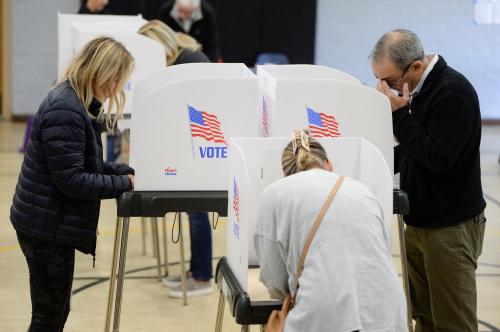President Joe Biden has every reason to celebrate the midterm election results, especially now that Democrats have added a 51st member of the Senate with the reelection of Senator Raphael Warnock. As Michael Beschloss notes, Biden has enjoyed the strongest first-term midterm Congressional showing of any President in eighty-eight years. In that time, he is only the third president in his first midterm to gain or not lose Senate seats while losing fewer than 10 House seats (along with JFK after the Cuban Missile Crisis and George W. Bush after 9/11). But as our research shows, this election was as much about Trump as about Biden.
In many previous midterms, the results followed the president’s approval rating. So why didn’t Biden’s unpopularity hurt the Democratic congressional ticket as much as predicted? Our recent University of Maryland Critical Issues Poll post-election iteration offers some insight: nearly as many voters, 14%, said the midterm election was a referendum on Donald Trump as those who said it was a referendum on Joe Biden, 17%, with the difference falling within the 3.7% margin of error; and those who said it was the former tended to vote for Democratic candidates, while those who said the latter tended to vote for Republican candidates. To be sure, there was partisan variation, with more Republicans, 25%, saying it was a referendum on Biden than Democrats, 18%, saying it was a referendum on Trump. But importantly, Independents were nearly equally divided, with 15% saying the election was a referendum on Trump and 17% saying it a referendum on Biden.
In other words, Trump may have neutralized the impact of Biden’s low approval ratings. Indeed, it is unprecedented that a defeated former president remains such a central part of American politics—even seen by many of his supporters as the elected president. It is hard for many to evaluate Biden and his presidency without referencing Trump.
The following bar graphs illustrate the importance of the current and the former president in these elections:

It is also notable that nearly half of voters in the midterm election, 47%, said that Donald Trump hurt the Republican congressional candidates in the midterms, including one third of Republicans:

This perception is bolstered by other analyses that showed that Trump-backed candidates tended to be demonstrably less successful than other Republican candidates. Two critical Senate races—Pennsylvania and Georgia—where the outcome would have changed control of the chamber involved particularly weak, Trump-selected candidates. In contrast, these weak candidates faced strong Democratic candidates, Raphael Warnock in Georgia, and John Fetterman in Pennsylvania, even as the latter’s candidacy was somewhat weakened by the stroke that he suffered months before the election. There is plenty of evidence showing that many Pennsylvania voters saw Republican candidate, Mehmet Oz, as a carpet bagger, and Herschel Walker as unfit to be a US Senator. Both candidates were endorsed by Trump. It is also clear that Walker received far less support than the Republican candidate for governor, Brian Kemp, who had rejected Trump’s urging to interfere in the 2020 presidential election. It’s worth noting that this gap could have been a function of Warnock’s popularity, compared to Stacey Abrams, the Democratic candidate for governor.
Still, most voters didn’t see the election as a referendum on Trump or Biden, as most said they voted on issues; and as we noted prior to the election, abortion and democracy were high on the voters’ agenda even as inflation topped that agenda. Those pre-election findings were reinforced by our post-election findings: voters’ pre-election assessment of top issues closely matched their post-election ranking, affirming the relative electoral resonance of these issues, even as their importance varied somewhat across the partisan divide:


Both President Biden and the Democratic party have much to celebrate given the historic outcome of the midterm election—particularly in an election cycle where the expected outcome for the president’s party was predicted to be bleak. Without taking away from the accomplishments of the Biden administration, the outcome was likely more a result of the rejection of Donald Trump and many of his selected candidates than Biden’s achievements, which, in any case, failed to help the President’s approval ratings before and after the election. Certainly, polls, including ours, have also shown the centrality of the abortion issue, in light of the Supreme Court’s decision to overturn Roe v. Wade. But the unprecedented high visibility and constant presence of a defeated former president, claiming to have won an election he lost, reduced the impact of Biden’s low approval ratings, as those who saw the election as a referendum on Biden were almost equaled by those who saw it as a referendum on Trump.







Commentary
The midterm elections were as much about Trump as Biden
December 12, 2022